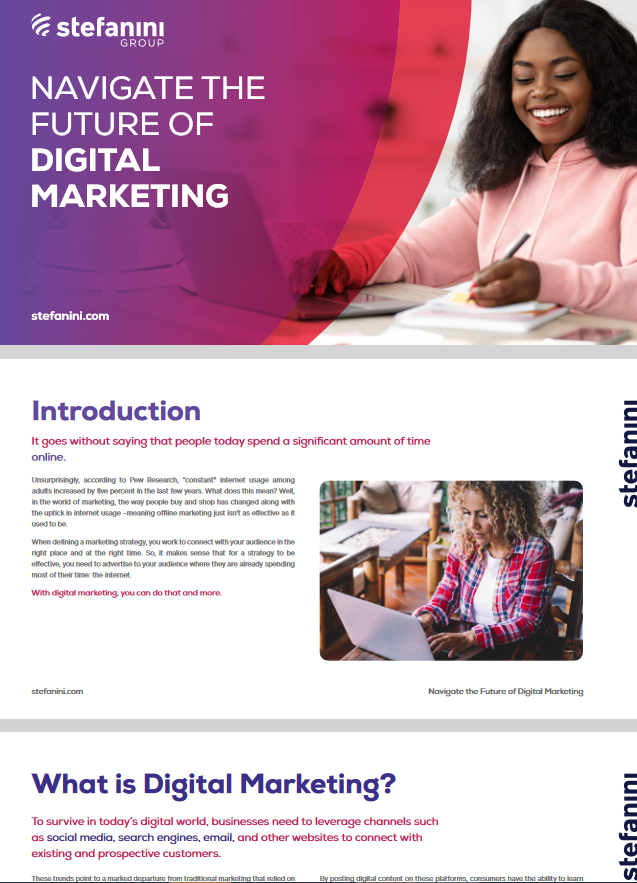- Use Chat GPT Wisely
- Six Ways Generative AI Can Benefit Digital Marketing
- ChatGPT for Competitor Analysis
- ChatGPT for Digital Marketing Campaigns
- Free download: The Digital Marketing Guide
AI has many use cases for digital marketing, from campaign planning to competitor analysis and marketing analytics. It is important to remember that ChatGPT is a tool, not the end-all be-all.
ChatGPT is a generative AI tool that creates text, art, music and video via natural language processing (NLP).The platform reached 100 million active users within two months of its released to the general public. Google released its conversational AI, Bard, in early February. It’s a given that more will come onto the market in a relatively short period. Competing tech companies are racing to launch their generative AI models to the market.
Overall, AI is cool. Anyone with basic computer skills can create a school paper or a photo-realistic image by typing what they want into a prompt. It can be fun for novices to use. Beyond that, AI has far-reaching possibilities to help people and society.
Furthermore, ChatGPT offers many uses for digital marketing. From competitor analysis to performance measurement and topic research.
The process of using ChatGPT is relatively easy. For example, say a new user enters text like, “Tell me about the life and times of Abraham Lincoln.” The chatbot will generate an essay about our revered 16th US president. It’s fairly simple – enter text — badda boom, badda bing! You have content!
Use Chat GPT Wisely
Fact: AI models need training data.
When you enter data into an AI application, it becomes part of the data collective. That data no longer belongs to you. The AI creator can use that data to improve services. Moreover, the AI creator’s partners can share your data for various reasons.
Simply put, the data entered is likely not private to you anymore. Users must consider how they apply the technology.
How much of the data is yours?
A massive language model powers ChatGPT. It needs that data to work and to perform better over time. Like a human, the more training a model has, the more it knows. Then, the model improves on detecting patterns to anticipate what’s coming and generate plausible text.
According to Uri Gal, professor of business information systems at the University of Sydney: “OpenAI, the company behind ChatGPT, fed the tool some 300 billion words systematically scraped from the internet: books, articles, websites and posts – including personal information obtained without consent.
If you’ve ever written a blog post, product review, or commented on an article online, there’s a good chance ChatGPT consumed this information.”
If you’re interested in learning more about personal data, privacy and copyright concerns, we included links at the bottom of this article.
Writers, Content Creators and Marketers
Writers in every category may encounter challenges when using generative AI. Nearly anyone can get into trouble using generative AI. People who aren’t proficient in law can claim they are unaware of copyright rules. Perhaps an attorney is enticed by AI’s possibilities and doesn’t take a step back and consider how using generative AI might influence law.
Moreover, many digital marketers and content creators claimed their careers were over. However, it’s helpful to step back from the noise and think emotions through. The first AI writing assistants appeared in 1980, but proper AI content tools showed up after 2010. Since then, writers and bloggers have implemented AI into their content strategies, and people have been okay with that. When ChatGPT came onto the scene, some people started worrying about job security.
Many writers ask:
- Can I compete with AI-generated content?
- Is it worth the effort to try to beat it?
- Why would a client or employer pay me since they can generate free content in ten seconds or less?
Content creators who know their capabilities, talents, experience and unique voice don’t need to stress out because generative AI can’t:
- Produce quality, factual content free from human interference
- Come up with original material
- Doesn’t understand emotions – the essence of content writing
For content professionals aware of their writing abilities, generative AI can be a helpful research and productivity tool.
Six Ways Generative AI Can Benefit Digital Marketing
Audience Reach and Engagement
Digital marketers who want to improve their campaigns and connect with their target audiences can benefit from ChatGPT.
- Content creation for blog posts, social media updates and other types of content. With a topic or keyword, the chatbot can suggest headlines, opening sentences and even complete paragraphs for use in marketing materials.
- Audience research helps digital marketers understand their target audience better. By analyzing large volumes of data, ChatGPT can identify standard customer segments’ shared characteristics, behaviors, and preferences.
- Customer engagement on social media or other platforms. Chatbots like ChatGPT can be programmed to answer common questions, provide customer support and even make product recommendations.
- Data analysis helps digital marketers analyze large data sets to identify trends, patterns, and insights. Marketers make data-driven decisions about their campaigns and strategies by researching large data sets.
- Personalized customer experiences. By analyzing customer data, ChatGPT can provide recommendations for products or content tailored to individual interests and needs. ChatGPT can help businesses create unique experiences for new audiences, increase engagement and foster trust.
- SEO optimization improves search engine results which drive traffic to its site by analyzing search queries and identifying relevant keywords.
ChatGPT can be a powerful tool for businesses that want to reach new audiences, grow their customer base, make effective marketing campaigns, and build stronger relationships with potential and current customers.
ChatGPT for Competitor Analysis
Businesses formulate a SWOT analysis to determine how competitive they are in their strategic planning.
The study looks at four essential factors often compared to determine how competitive a company might be in its field. A thorough SWOT analysis can help you make decisions based on facts, or it might offer ideas for new products or ways to do things.
So, here’s how ChatGPT generates SWOT analyses for competitor research:
- Strengths: ChatGPT can analyze a competitor’s strengths and advantages over your business. By analyzing their marketing strategies, customer base, product features, and other factors, ChatGPT can identify what makes them successful and suggest ways for your business to emulate or improve upon those strengths.
- Weaknesses: ChatGPT can identify a competitor’s weaknesses by analyzing what they do poorly or where they fall short compared to your business. ChatGPT can suggest areas where your business can differentiate itself and gain a competitive advantage by analyzing customer reviews, social media engagement, and other metrics.
- Opportunities: ChatGPT can identify potential opportunities for your business by analyzing market trends, customer needs, and other factors that may be relevant to your industry. By analyzing the competitor’s product offerings, marketing campaigns, and customer engagement strategies, ChatGPT can suggest ways to capitalize on these opportunities and grow your business.
- Threats: ChatGPT can identify potential hazards to your business by analyzing market trends, competitive pressures, and other factors that may impact your industry. By analyzing the competitor’s marketing campaigns, product offerings, and customer engagement strategies, ChatGPT can identify potential threats and suggest ways to mitigate them or turn them into opportunities.
When ChatGPT does a SWOT analysis, it gives a more in-depth look at how the competition is doing and where there are chances for growth and improvement. Companies stay ahead of their rivals by using the chatbot’s skills, developing better plans, and making data-based decisions.
ChatGPT for Digital Marketing Campaigns
ChatGPT can help plan and execute digital marketing campaigns in several ways:
- Campaign strategy – the platform helps develop a digital marketing strategy tailored to unique goals and target audiences. By analyzing customer data, market trends, and industry best practices, ChatGPT can suggest ideas for campaign themes, channels, and tactics.
- Channel selection – ChatGPT can suggest the most effective channels for a particular campaign based on the target audience, campaign goals and budget. Channels include social media platforms, email marketing, search engine marketing and other digital marketing channels.
- Performance analyses help businesses monitor and analyze digital marketing campaigns’ performance by providing insights into what works and does not. This information can be used to adjust the campaign strategy and tactics in real-time to optimize results.
When marketers leverage ChatGPTs capabilities, companies can create better marketing campaigns, connect with their target audience, and reach their marketing goals.
ChatGPT’s Content Limitations
ChatGPT, a powerful AI-based platform, has some constraints. It can provide answers based on the data it was trained on, regardless of the information’s accuracy.
Also, ChatGPT is not a search engine. Instead, it produces responses based on the information it learned from training. To prevent mistakes, ensure to fact-check output to ensure content is accurate and up-to-date. The platform can only provide some necessary information; it cannot fully understand conversational context and subtleties, so we emphasize editing, proofreading, and fact-checking.
Another significant limitation to be aware of is the potential for bias; it could produce biased information if it learned from biased training data. As a result, businesses must be vigilant in monitoring chatbot output for bias and offensive content.
The Recap
ChatGPT and generative AI have many use cases for digital marketing. As with nearly every technological innovation, it’s best to stay vigilant to ensure confidential, sensitive business and personal data stays where it belongs. Furthermore, ensure you fact-check and look for biased content the model may have generated.
Chat GPT benefits content creators, SEO experts, email campaign managers, and more. The platform bolsters marketing productivity in several ways, including (but not limited to):
- Simplifying and streamlining research
- Informing campaign strategy
- Competitor analysis
- SEO keyword research and strategy
- Audience targeting and segmentation
- Consumer research
- Subject matter research
Stefanini and the Co-Creation Method
Our customers are our partners. Because relationships are at the heart of what we do, we work collaboratively with clients to build the perfect solution. We focus on collaboration and co-creation, listening to and learning about pain points, goals, and future vision.
Stefanini Digital Marketing solutions include
- Creative content and branding
- Digital channels and commerce
- Performance and Growth
- Consumer and Market Insights
- Customer Relationship and Lifecycle Management
Stefanini is in the digital marketing vanguard. When creatives and “nerds” come together, spectacular ideas are born. We offer a wide range of services, including artificial intelligence, analytics, user-centered design, and marketing strategy.
Would you like to know more? Reach out to an expert today!

Expand your knowledge by exploring our FREE downloadable resources:
If you would like more information and thought leadership on generative AI and ethics, here are a few links you may find helpful:
- ChatGPT is a data privacy nightmare. If you’ve ever posted online, you ought to be concerned by Uri Gal, University of Sydney. From The Conversation.
- A “Living” AI: How ChatGPT Raises Novel Data Privacy Issues, Alexa Johnson-Gomez, LawSci Forum, University of Minnesota Law School
- Microsoft is chill with employees using ChatGPT — just don’t share ‘sensitive data’ with it by Diamond Naga Siu, Business Insider
- Generative AI ChatGPT Can Disturbingly Gobble Up Your Private And Confidential Data, Forewarns AI Ethics And AI Law by Lance Eliot, Forbes



















